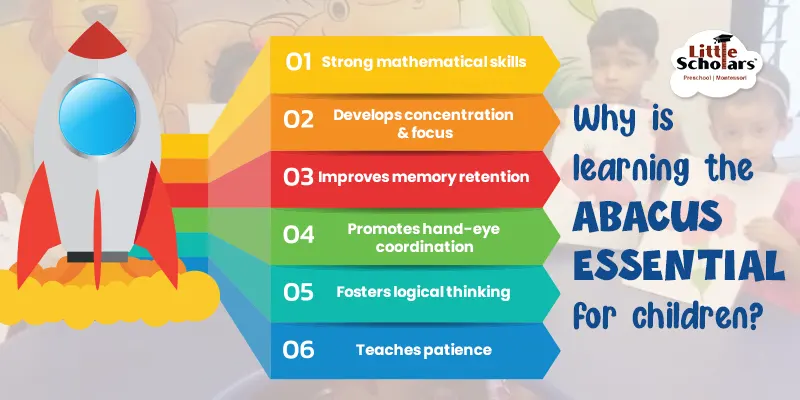
Do you want your child to solve maths within a few minutes without a calculator? That sounds amazing, right? Well, this is the power of the abacus, which can greatly improve a child’s cognitive abilities.
While many view the abacus as an outdated educational tool, it still offers various advantages that go beyond solving just mathematical problems.
If your child is struggling to solve arithmetic questions, or even if they are doing well, and you want to boost their performance, the abacus might be the practical solution.
Little Scholars Playhouse and Montessori, one of the top nursery schools in Kolkata, has recognised the importance of the abacus and encourages parents to enroll their children in such programs to build a strong foundation in logical thinking, memory and critical abilities.
In this blog, we have listed the benefits of abacus training for young learners and explained why it is so effective for children.
An abacus is an ancient arithmetic tool used for performing arithmetical operations like addition, subtraction, multiplication and division. It consists of a wooden or plastic frame with either rods or wires, each containing a series of beads that can be moved back and forth.
Each bead represents a distinct numerical value, allowing individuals to perform calculations efficiently. Though the invention of the abacus can be traced back to civilisations like China, Mesopotamia, and Egypt, it is used today as a proven method to solve mental maths.
Little Scholars Playhouse and Montessori, one of the top nursery schools in Kolkata, lists the following advantages of abacus training for children.
The abacus is an excellent tool that helps children to visualise numbers and perform calculations by manipulating the beads. As they become more proficient in using the abacus with constant practice, they can solve complex problems accurately in a short span of time. This reduces their dependency calculations and boosts performance.
Abacus learning demands precision and attention to detail. As children advance, they start visualising the beads in their minds. More and more, they engage with the beads and perform calculations; the process significantly leads to an enhanced ability to focus and concentrate on activities both in and out of the classroom.
Using the abacus has a direct influence on a child’s memory retention capacity. Regular practice strengthens their ability to recall information quickly. The improved visualisation skills not only aid in arithmetic calculations but also benefit other areas of learning like language, creativity and comprehension.
Moving beads while mentally processing numbers enhances coordination between the eyes, hands, and brain. This not only strengthens hand-eye coordination but also improves fine motor skills, which are essential for writing, drawing, and other classroom activities.
The abacus teaches children to break down large problems into structured and manageable steps. They learn to analyse mathematical calculations step by step, considering different approaches and strategies. These problem-solving skills help them think critically, especially about concepts related to subjects like technology and science, later in life.
Mastering abacus learning requires patience and consistency. Over time, the process teaches the young learners the value of patience and discipline. These qualities not only help them to become better learners but also shape their overall personality.

The abacus might seem like a simple counting tool, but it unlocks endless learning opportunities. Little Scholars Playhouse and Montessori, one of the top nursery schools in Kolkata, believes that with the right guidance, abacus training can set the stage for academic success in young learners.

Copyright © littlescholars.org.in | All Rights Reserved. Website Development & Digital Partner – BUSFAM